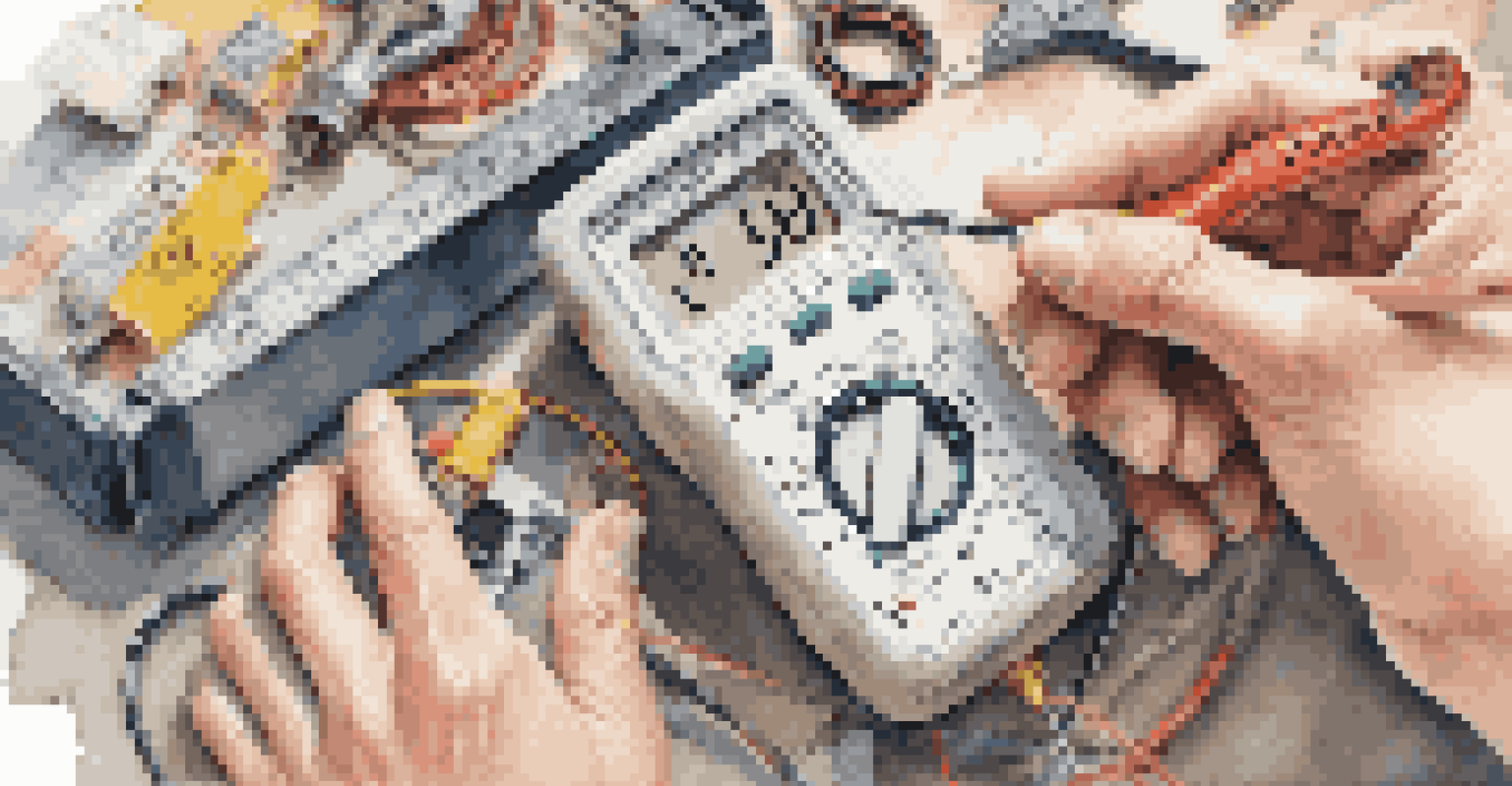Home Inspections: A Safety Measure for Renovation Projects

Understanding the Importance of Home Inspections
Home inspections are a crucial step in any renovation project, acting like a health check for your property. They help identify existing issues that may not be visible, such as structural damage, pest infestations, or outdated electrical systems. Think of it as a preventative measure, catching potential problems before they escalate into costly repairs.
An ounce of prevention is worth a pound of cure.
By investing in a home inspection, you not only safeguard your investment but also ensure the safety of everyone involved in the renovation. It’s like having a trusted mechanic check your car before a long road trip—ensuring everything is in good shape can save you from breakdowns down the line. Knowledge is power, especially when it comes to home renovations.
Moreover, a thorough inspection can provide you with leverage in negotiations with contractors or sellers. If issues are discovered, you can discuss repairs or adjustments to the project plan, potentially saving you money and headaches later. Ultimately, a home inspection lays the groundwork for a successful renovation.
Identifying Hidden Issues Before Renovation
One of the standout benefits of a home inspection is its ability to uncover hidden issues that could derail your renovation project. For instance, problems like mold growth, faulty plumbing, or inadequate insulation may be lurking behind your walls, waiting to surprise you. Addressing these issues beforehand can prevent serious complications during or after renovations.

Picture planning a beautiful kitchen remodel only to find out that the plumbing is outdated and could lead to leaks. Without a home inspection, you might not discover this until after the work is done, leading to costly repairs and frustration. By identifying these hidden issues early, you can adjust your renovation plans accordingly and keep everything on track.
Home Inspections Prevent Costly Issues
Conducting a home inspection helps identify hidden problems early, saving you from expensive repairs during renovations.
Additionally, knowing about any safety hazards, such as old wiring or structural weaknesses, allows you to prioritize repairs that protect your home and its occupants. This proactive approach not only enhances your renovation’s success but also enhances your peace of mind throughout the process.
Ensuring Compliance with Local Building Codes
Every renovation project must comply with local building codes, which serve to ensure safety and quality. A home inspection can help you understand these codes and how they apply to your project. This ensures that your renovations meet all necessary regulations, preventing fines or rework down the line.
The best way to predict the future is to create it.
Imagine investing time and money into a renovation, only to find out it doesn’t meet local standards. This could result in costly adjustments or, in some cases, the need to undo completed work. A thorough inspection will inform you about relevant codes, helping you plan your project efficiently and avoid such pitfalls.
Furthermore, working with a building inspector during the planning phase can streamline your renovation process. They can guide you on what is permissible and what isn’t, providing insight that can save you time and resources while enhancing the safety and longevity of your renovations.
Evaluating Structural Integrity and Safety
One of the primary focuses of a home inspection is to assess the structural integrity of your property. This includes checking the foundation, roof, and load-bearing walls, which are crucial for the overall safety of your home. A weak structure can lead to significant problems, particularly during renovations that involve heavy installations or alterations.
Consider the implications of starting a renovation on a compromised foundation. You might be gearing up for a beautiful new addition, but if the structure can’t support it, you could face severe safety issues. By having a professional evaluate your home’s structure beforehand, you can make informed decisions about your renovation plans.
Ensure Compliance with Building Codes
Home inspections help you understand local building codes, ensuring your renovations meet safety regulations and avoid costly adjustments.
Additionally, understanding the structural soundness of your home can help you determine which renovations are viable and which may need more extensive planning or support. This clarity ensures that your renovation not only looks great but is safe and secure for years to come.
Assessing Electrical and Plumbing Systems
Outdated electrical and plumbing systems can pose significant safety risks during renovations. An inspection will evaluate these systems to ensure they can handle any new demands that renovations might introduce. For example, adding a new kitchen may require more outlets and upgraded wiring to keep up with modern appliances.
Imagine embarking on a kitchen renovation only to discover that your home’s wiring is insufficient to support the new refrigerator, oven, and other appliances. This could lead to unplanned expenses and delays as you scramble to upgrade your electrical system. By assessing these systems beforehand, you can avoid such disruptions.
A home inspection can also identify plumbing issues, such as leaks or inadequate water pressure, that could affect your renovation plans. Knowing the condition of these systems allows you to budget for necessary upgrades while ensuring the safety and functionality of your newly renovated spaces.
Saving Money in the Long Run
While a home inspection might seem like an additional expense upfront, it can actually save you money in the long run. By identifying issues before they become serious problems, you can avoid costly repairs and potential renovation setbacks. It’s like spending a little on maintenance to prevent a major breakdown later.
For instance, if a home inspection uncovers a minor plumbing leak, addressing it now can prevent water damage that could cost thousands to repair. Similarly, identifying structural issues early allows you to incorporate necessary fixes into your renovation budget instead of handling them after the fact.
Choose a Reliable Home Inspector
Selecting a certified and experienced home inspector is crucial for a thorough evaluation of your property's condition before renovation.
In addition, having a comprehensive understanding of your home’s condition can lead to more accurate budgeting for your renovation projects. This can help you allocate funds effectively, ensuring a smoother process and potentially saving you from financial strain down the line.
Finding the Right Home Inspector
Choosing the right home inspector is vital to ensuring that your inspection is thorough and reliable. Look for certified professionals with good reviews and experience in residential inspections. Asking friends or family for recommendations can be a great starting point, as personal experiences often lead to finding trustworthy services.
Don’t hesitate to ask potential inspectors about their qualifications and previous work. A good inspector should be transparent about their methods and ready to answer any questions you might have. This dialogue not only builds trust but also gives you peace of mind that your home is in capable hands.

Moreover, consider scheduling inspections during the day to allow for adequate lighting and visibility. This can help the inspector identify issues that might be missed in dim conditions. Investing time in finding the right inspector can make all the difference in the quality of your renovation project.
Final Thoughts on the Value of Home Inspections
In conclusion, home inspections are an essential safety measure that should not be overlooked in any renovation project. They offer invaluable insights that can help you avoid issues, ensure compliance, and safeguard your investment. Think of it as a safety net that allows your renovation to proceed smoothly and successfully.
By uncovering hidden issues, assessing systems, and evaluating structural integrity, inspections provide a comprehensive understanding of your home’s condition. This knowledge empowers you to make informed decisions and prioritize safety throughout the renovation process.
Ultimately, taking the time to schedule a home inspection before starting renovations can lead to a safer, more efficient, and cost-effective project. As you embark on your renovation journey, remember that investing in a home inspection is investing in your home’s future.